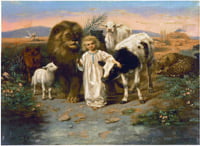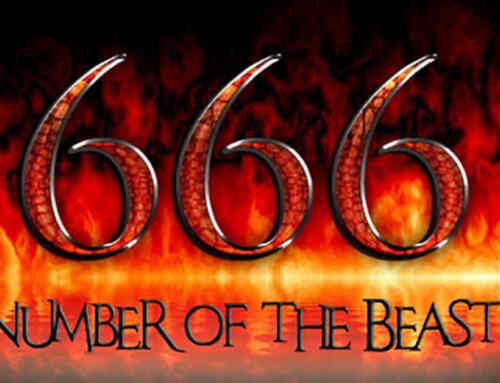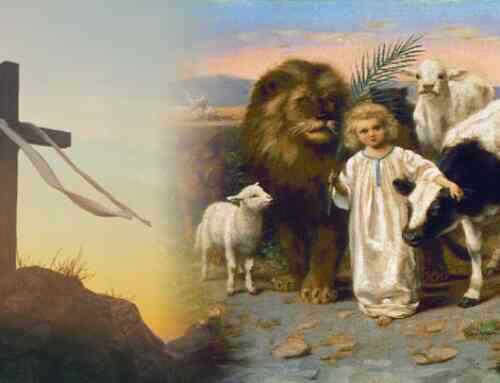The great tribulation is mentioned in Revelation 7:19-14: "After this I looked and there before me was a great multitude that no one could count, from every nation, tribe, people and language, standing before the throne and in front of the Lamb…. 'These are they who have come out of the great tribulation; they have washed their robes and made them white in the blood of the Lamb.' "
The account of the "great multitude" is given just after John the Revelator hears about the 144,000, the number of the servants of God who have been sealed on their foreheads. We read about these 144,000 again in Revelation 14: "And they sang a new song before the throne and before the four living creatures and the elder. No one could learn the song except the 144,000 who had been redeemed from the earth. These are those who did not defile themselves with women, for they kept themselves pure…. No lie was found in their mouths: they are blameless." (verses 3-5) These 144,000 appear to be the Church, the "little flock" (Luke 12:32), those that "enter through the narrow gate," the "few" that find the narrow way that leads to life. (Matthew 7:13, 14) That they "did not defile themselves with women" shows us that they did not participate with the systems of this earth.
When people realize they are sinners and truly recognize the sacrifice Jesus has made for them, they will be deeply grateful to accept Him as their Savior. In thankfulness and joy they will want to follow Him. We know that following the Lord is not easy. Their faith will be tested, and Jesus said, "In the world you have tribulation…" (John 16:33) "For it has been granted to you on behalf of Christ not only to believe on him, but also to suffer for him." (Philippians 1:29) This kind of tribulation comes as a result of being faithful to the Lord and refines our faith and character.
Upon accepting the invitation to become of the bride of Christ, they are given a "robe" covering all their sins – justification. This is shown in the picture of the wedding garment of Matthew 22:11, 12. This justification makes them pure before God; their "robe" is white and clean. If a Christian would ever renounce that justification and refuse their robe of justification, they would have no more standing before God.
All consecrated Christians want to be of the "little flock." But the world, the flesh and the devil are their constant foes. Their robes may become soiled with compromise, cowardice, or partially-willful sins. However, "if we confess our sins, He is faithful and righteous to forgive us our sins and to cleanse us from all unrighteousness." (I John 1:9) If we go regularly to the Lord for forgiveness, we will have our robes cleansed. We are instructed to keep ourselves "unstained by the world." (James 1:27)
However, if we become too distracted by worldly advantages or by our own desires; or if we don't recognize Satan's temptations, we may not realize how soiled our robes are becoming. We may forget how much we need our Savior and neglect to come to Him for forgiveness. It is such Christians who will have to experience tribulation which will open their eyes to the hollowness of the world's promises or the deceitfulness of one's own heart. The consecrated believers at the very end of the age who have failed to give their hearts completely and in constancy to the Lord will apparently have to live through "a great tribulation, such as has not occurred since the beginning of the world until now, nor ever will." (Matthew 24:21; also Daniel 12:1) This kind of tribulation is meant to bring them fully back to the Lord, similar to the situation where the Apostle Paul speaks about turning a wayward believer over "to Satan for the destruction of his flesh, so that his spirit may be saved in the day of the Lord Jesus." (I Cor. 5:5)
But to those who give all diligence to make their calling and election sure, the Apostle Peter says: "For so an entrance shall be ministered unto you abundantly into the everlasting kingdom of our Lord and Savior Jesus Christ." (II Peter: 1:11)












